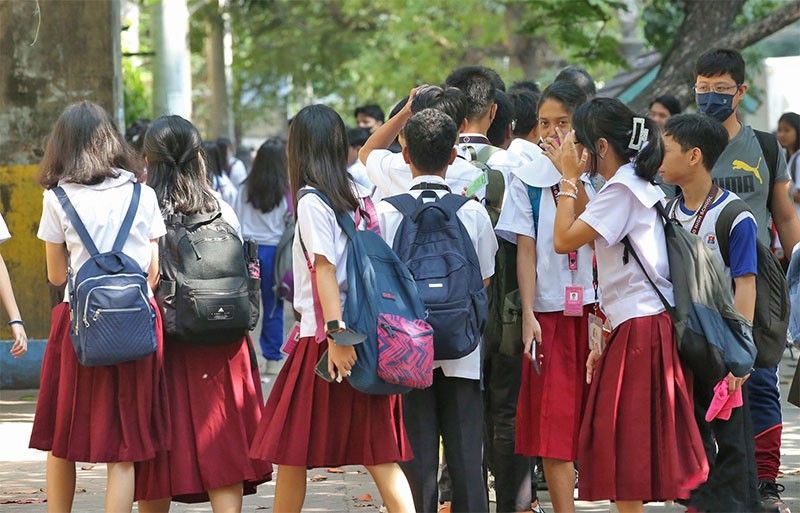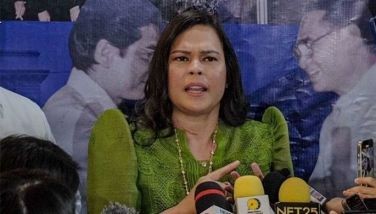DepEd open to early return to June-March academic year

MANILA, Philippines — Acceding to a clamor for an immediate return to the old school calendar due to extreme heat, the Department of Education (DepEd) yesterday said it has suggested to President Marcos to end the coming school year 2024-2025 in March 2025 and start the succeeding school year by June.
“In response to the recent clamor for a more immediate reversion to the April-May school break, the department has already submitted a letter to the Office of the President presenting other options, including a more aggressive alternative (to end) school year 2024 to 2025 in March 2025,” DepEd Assistant Secretary Francis Bringas said during the Senate inquiry into classroom conditions amid extreme heat.
Bringas added that the DepEd could not yet disclose specifics of the aggressive transition as Marcos still needs time to study the options they presented.
Under the new approach drawn up by the DepEd’s Bureau of Learning Delivery, however, Bringas noted that schools would only have 165 days of in-person classes – falling short of the 180 to 220 days prescribed by law.
To ensure that students will not continue lagging in learning competencies, the education official explained that the DepEd may have to opt for alternative delivery mode (ADM) classes during weekends.
“Still, we have the option to go for ADM for other days apart from weekdays… We have to look for some days for ADM … definitely Saturdays. This is one of the compromises for the aggressive approach,” Bringas said.
“The aggressive approach that would end our SY this March 2025 would have several implications: One, we will have shorter number of days in the SY, we have a Republic Act (RA) that tells us the minimum would be 180 up to 220 days… But our option could be to count some days as ADM, which are not necessarily in-person classes,” he added.
Aside from this, students may need to have a shorter end of school break if the SY would end by March 31, 2025 and start in June 2025, according to the DepEd official.
“We will still have April and May, but still that means the learning competencies would be cramped in a (fewer) number of days, but still, we have the option to go for ADM for other days apart from weekdays,” he said.
Finally, Bringas stressed that the aggressive shift could have implications for the proportional vacation pay (PVP) of teachers, the compromises to which would be once again discussed with teachers’ groups.
Sen. Sherwin Gatchalian, who chairs the Senate basic education committee, said he prefers the DepEd’s aggressive approach, underscoring the need to immediately revert to the old school calendar due to the unpredictability of the weather.
Various groups have been calling for the immediate return to the old school calendar, citing the heat experienced by students in March and April.
Even lawmakers have sought to intervene by filing proposals to shift to the old calendar, stressing that the current school calendar running from August to June is inappropriate in the country.
Last Feb. 19, the DepEd issued DepEd Order No. 3, series of 2024, adjusting the end of the current SY from June 15 to May 31, 2024.
The same order also set the opening and closing dates for SY 2024-2025 as July 29, 2024 and May 16, 2025, respectively.
If Marcos approves the DepEd’s aggressive transition, the agency may have to abandon the phased transition, which could only take full hold three SYs from now.
No outdoor activities
Meanwhile, the Department of Health (DOH) said that schools should opt out of outdoor activities during months that have extreme heat conditions, like April and May.
Asked by Gatchalian whether it would be unsafe for students to spend time outdoors for school activities, Dr. Vito Roque Jr. of the DOH-Epidemiology Bureau answered in the affirmative.
“Yes, there should be no outdoor activities because they would be exposed to extreme heat,” Roque said.
He also underscored the need for the public to shun outdoor activities such as fiestas.
Pressed for the DOH’s suggestion regarding the immediate shift to the old school calendar, the DOH official said the agency would submit to the Senate committee its position paper with specific recommendations once Health Secretary Teodoro Herbosa signs it.
The DOH, however, issued a statement saying that children face greater risks during extreme heat compared to adults.
“Compared to adults, children experience a greater heat gain from the environment, and yet have the reduced ability to dissipate this heat by evaporation, secondary to their greater surface for body mass ratio and sweating capacity, respectively,” Roque said, quoting the statement.
“Children have less experience recognizing heat stress symptoms, less awareness of their hydration status and less of an urge to drink water. Hence, they have more difficulty modifying their behavior and the environment, which makes them more vulnerable to heat related illnesses,” he added.
Unburdening
As part of the DepEd’s measures to unburden teachers from administrative tasks and allow them to focus solely on teaching duties, the agency has released an order that mandates teaching overload pay should teachers work beyond working hours and outside actual teaching duties.
Vice President and Education Secretary Sara Duterte on Monday signed DepEd Order (DO) 005 series of 2024, which plots the policy guidelines on the rationalization of teachers’ workload in public schools and payment of teaching overload.
Under the DO, teachers are prescribed to work only eight hours of service per day, six of which should be devoted to actual classroom instruction, while the remaining two hours should be “for work incidental to the normal teaching duties, which may be spent within or outside the school premises.”
The DepEd said that other teaching-related work needs to be compensated in accordance with Republic Act 4670 or the Magna Carta for Public School Teachers.
“In the exigency of service, actual classroom teaching in excess of the required six hours shall be compensated through the payment of teaching overload, provided that it does not exceed two hours per day,” the DO stated.
The policy also specified that teachers’ ancillary tasks should be under the following categories: curriculum planning, curriculum delivery and pedagogy, assessment of learner’s progress and homeroom guidance and management.
“Other tasks that do not fall under the specified teaching-related and ancillary tasks of the teachers shall be delegated to the administrative personnel of the schools,” the DepEd said in a separate statement.
It added that the payment of teaching overload should be made every quarter, “subject to the extent of allotment for the purpose.”
“However, in case of insufficiency of funds, teaching overload hours shall be converted to earned VSC (vacation service credits) provided under the existing DepEd policy,” the agency said.
The Alliance of Concerned Teachers (ACT) welcomed the new policy, saying that it is a “historic victory” for public school teachers.
“While the Magna Carta for Public School Teachers has been a law since 1966, this is the first time that the provisions on overload pay and teaching hours will actually be implemented through a department order. This is a major step forward in addressing the long-standing issues of teacher workload and welfare. We will continue to monitor the implementation of this order and ensure that it is enforced to benefit our teachers,” ACT Teachers president Antonio Tinio said.
While it welcomed the DO as a positive development, the Teachers’ Dignity Coalition (TDC) found some provisions of the issuance concerning and problematic as they could be “misinterpreted” against the favor of teachers.
“We will request a dialogue with the DepEd for further clarification on this matter. In the simplest terms, the implementation of any provision of the Magna Carta should be primarily based on the provision of benefits, proper teaching conditions, rights and welfare of teachers. If this is not the case and it will be a burden, it is not consistent with the purpose and principle of the law,” the TDC said.
- Latest
- Trending































